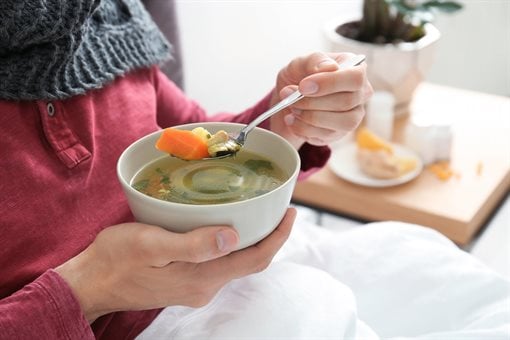
Recovering from Covid-19? Here's what you need to know about nutrition

According to Adsa (The Association for Dietetics in South Africa) people recovering from Covid-19 who also suffer from diabetes and cardiovascular disease need to take special care when it comes to their nutrition during post-Covid recovery. Registered dietitian and Adsa spokesperson Andiswa Ngqaka says: “Pregnant women who are recovering from Covid also have questions around nutrition. They feel anxious to return to health as quickly as possible and, of course, want to make sure their bodies are supporting the development of their unborn babies as they recover. In addition, family members who are supporting loved ones who are recuperating at home after a stay in ICU may be facing challenges when it comes to nutrition.”
Omy Naidoo, another Adsa spokesperson and registered dietitian, points out that people recovering from Covid may still be experiencing health issues. He says: “Covid symptoms such as the loss of taste and smell can persist for quite some time, and these senses have a major impact on appetite. Chronic fatigue, weight loss, loss of muscle mass and general weakness are common too. The main goal of recovery nutrition is to provide enough of the nutrients that support healing and, therefore, a loss of appetite is a challenge that needs to be addressed.”
The general nutrition tips for post-Covid recovery include:
- When fighting an infection, the body needs more energy and more fluids. Eat a variety of foods every day to ensure balanced nutrition
- Eat plenty of vegetables and fruit, and include plant-based meals to ensure optimal intake of immune-supporting vitamins and minerals
- Make whole grains and high fibre foods (which includes veg, fruit and salads) part of most meals
- Drink plenty of clean safe water as adequate hydration is essential to recovery, and focus on hydration particularly if you are still experiencing symptoms such as fever, vomiting and diarrhoea
- In the case of muscle mass loss, focus on a high protein diet to support muscle recovery. Good sources of protein include lean chicken, eggs, dairy and fish as well as legumes and pulses such as beans, lentils and chickpeas
- Limit sugary foods and drinks, highly processed and fast foods
Naidoo points out that different strategies may be necessary if you or your recovering family member is experiencing a chronic loss of appetite. He says: “Oral nutrition supplement drinks may be necessary if the person is unable to consume enough protein and calories each day. Good quality oral nutrition supplement drinks are easy to consume, and they contain a balance of protein, carbohydrates, fat and necessary micronutrients.”
In addition to general nutrition guidelines, people living with other health conditions and recovering from Covid-19, should take note of Andiswa Ngqaka’s advice:
Additional nutritional advice for people with diabetes or heart disease recovering from Covid-19
- Pay attention to your glucose control. Regular control will manage complications caused by low and high glucose levels
- It is important to eat small frequent meals, for instance, three meals a day and healthy snacks like nuts in between, to avoid any fluctuations of glucose levels. Fluctuations in blood glucose predisposes to serious complications and most commonly diabetes ketoacidosis
- An ideal diet is high in fibre, whole grains, legumes with plenty of vegetables and fruits
- Avoid sugar and unhealthy fats, reduce salt intake and reduce high fat and processed meat products
- Foods that support immunity and reduce inflammation are important for the heart. Focus on vegetables and fruits of different colours to provide a spectrum of vitamins and minerals to support the immune system
- Infections such as Covid-19 contribute to a rise in blood sugar, therefore, you must ensure you drink sufficient fluids – clean safe water is best
- It is important not to overwork and to get a good night’s sleep
Additional nutritional advice for people recovering from Covid-19 after being in ICU
- Address loss of appetite by encouraging small, frequent meals and encourage a variety of foods to provide different nutrients
- Focus on foods that are rich are vitamins and minerals, such as vegetables and fruit, high fibre and wholegrain foods
- Aim to have a high protein food at each meal, to help replace muscle loss and regain your strength
- A dietitian can recommend oral nutritional supplement drinks that may be necessary
Additional nutritional advice for pregnant women recovering from Covid-19
- Include foods rich in iron, such as spinach, asparagus, broccoli, dried apricots, lentils, beans, eggs, fish, chicken and lean red meat
- Include foods rich in folate, such as brussels sprout, mushrooms, green leafy vegetables, peas, chickpeas, kidney beans, lentils, butter beans and soya beans
- If you’re feeling a loss of appetite, focus on healthy snacks and creating more frequent healthy mini meals
- It is important to rest well and take it easy during recovery
What’s most important is that if you or a recovering loved one are experiencing difficulty following these guidelines, then you should get help. Nutrition is too important to recover to struggle on alone with an inadequate intake of nutrients. Your dietitian can help you with an individualised plan to meet your unique post-Covid recovery nutrition challenges and provide ongoing patient support. They can provide expert guidance and recommendations when it comes to nutrient-rich, fortified, tasty foods and special supplements that will support rehabilitation, reduce risks of complications and shorten your recovery time.
To find a registered dietitian in your area, please visit www.adsa.org.za
- Changing systems to reduce obesity in SA 4 Mar 2025
- What dietitians say about 2025’s top nutrition trends 9 Jan 2025
- Navigating nutrition in summer 13 Nov 2024
- How to eat right for a better life 9 Oct 2024
- Advancing equity - breastfeeding support for all 30 Jul 2024
Association for Dietetics in South AfricaThe Association for Dietetics in South Africa (ADSA) is the professional organisation for Registered Dietitians. The primary aims of the Assocation are to serve the interests of dietitian in South Africa and promote the nutritional well being of the community. |
